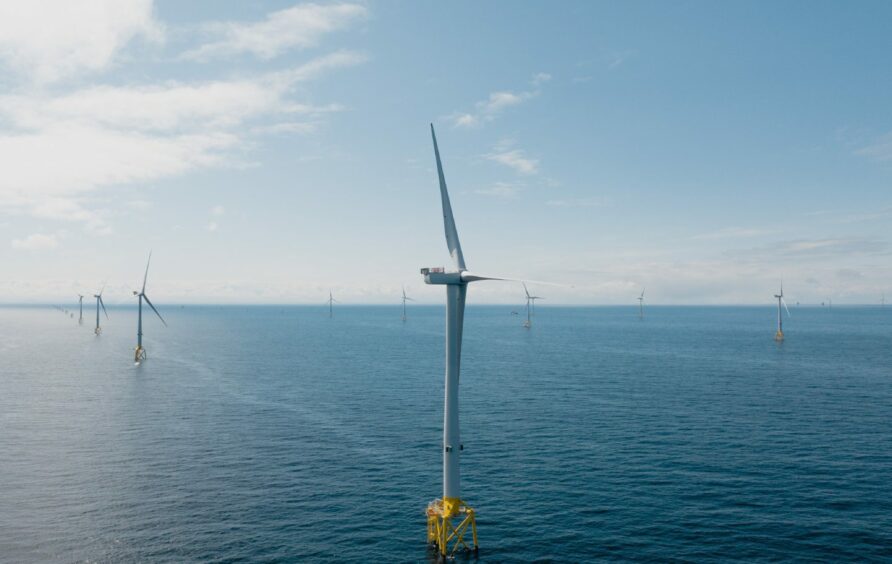
The UK’s efforts to reduce the cost of large-scale renewable energy has brought major offshore wind schemes to breaking point, a major developer has warned.
As a result, projects currently in development are “on a knife edge” due to the UK government’s “obsession” with delivering renewable energy at the lowest cost possible, a senior industry leader said.
Ocean Winds UK country manager Adam Morrison argued that the UK Government needs “to end the obsession with finding the bottom of the market all the time”.
He added: “You’re bringing forward projects that are right on the knife edge, and you shouldn’t try to build massive infrastructure like this on a knife edge.
“When a small thing goes wrong, like a shock in the supply chain or regulatory change, you create failed projects and nobody wins from that.”
He noted that offshore wind developers have been trying to persuade the UK Government to turn its focus away from driving down prices offered to wind farms in the form of contracts for difference (CfDs) as its attempts to drive competition in the industry.
The previous completed allocation round, AR5, was widely decried as a failure for offshore wind.
The UK Government offered CfDs at £44 per MWh for fixed bottom wind and £116 per MWh for floating, down from the previous round. The budget was also reduced compared to AR4, down from £285m to £227m.
However, while the government pushed down prices as it aimed to secure offshore wind capacity at the lowest cost, developers were dealing with inflation and rising interest rates, increasing the breakeven costs for their projects.
This led to offshore wind developers declining to bid in the round as the prices offered weren’t enough to fund their projects.
“It hasn’t been good for the UK market,” Morrison said. “You’ve got other offshore wind markets popping up that are willing to pay market entry prices and award higher tariffs to stimulate their industries and supply chains, whereas the UK has been fixated on just trying to take us to the point where it breaks, which is not healthy.”
As more markets, such as the US and East Asia, open up for offshore wind, the UK is now competing on a global scale. Not only are supply chains becoming more stretched as limited supplies and equipment head to better paying countries, but companies have more options about where to invest their money.
The big question is, Morrison said: “Is the economic reward big enough for the amount of risk and the importance of these projects? It’s not what it should be for the amount of risk we take.”
The low prices offered in AR5 meant that the government pushed up prices offered in the results-pending AR6, including offering strike prices for fixed wind to £73 per MWh and for floating offshore wind to £176 per MWh.
CfD reform
However, broader reforms to the CfD process are also on the cards. AR7 is due in 2025 and will look beyond strike price for offshore wind developers seeking to win a contract.
The UK Government is considering introducing “sustainable industry rewards,” offering additional funds for developers taking supply chain issues and their environmental footprints into account.
However, offshore wind developers have also raised eyebrows at the proposed reforms, warning it could add complexity and risk to the process.
“The CfD has been very successful and the government should evolve it rather than do anything too revolutionary,” Morrison said.
“We’ve also got wider energy market reform above us like a dark cloud at the moment. It makes sense to look at what our energy system is changing so significantly and rapidly, it’s sensible to look at the form of it.”
However, he warned that the UK needs to avoid wasting time trying to find the “perfect” system and focus on immediate high-reward changes.
“If you’ve got capital-intensive projects, you need to give them certainty,” Morrison said. “That’s where the UK could really drop the ball, creating so much uncertainty when we’re trying to get everyone to spend money.
“There are parts of our energy market that have to be reformed that are getting beyond problematic, so there has to be reform. But there has to be a bit of political bravery to put constraints around that and make some low-regret decisions fairly quickly.
“The financial reward or the returns have to be sustainable because it ultimately affects consumer bills then it’s a sensitive topic. Nobody will build GW-scale power generation without earning a return.”
Recommended for you

